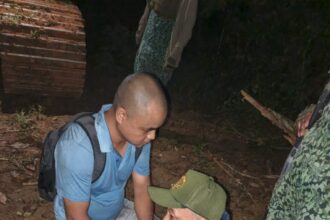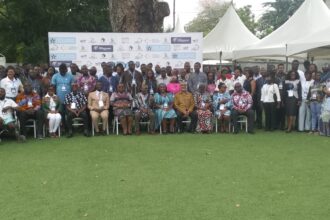The Birim North District Assembly in the Eastern Region has officially disseminated its 2026–2029 Medium-Term Development Plan (MTDP) and presented the 2025 Mid-Year Review at a well-attended Public Hearing held in New Abirem.
The event brought together a cross-section of stakeholders including the traditional leaders, Assembly Members, heads of departments and agencies, civil society representatives, the media, Persons with Disability among other distinguished personalities.
In his welcome address, the District Chief Executive (DCE) for Birim North, Hon. Antwi Hakeem Abdul described the event as “a significant milestone” in the district’s ongoing development agenda.
He emphasized the importance of inclusive governance and transparency, underscoring the Assembly’s commitment to fulfilling the requirements of the National Development Planning Commission Act, 1994 (Act 480), L.I. 2232, and Section 88 of the Local Governance Act, 2016 (Act 936).
“We are gathered to disseminate the 2026–2029 Medium-Term Development Plan and to present the 2025 Mid-Year Review. These exercises are not only part of good governance but are also legal obligations that promote stakeholder engagement,” Hon. Abdul stated.
While acknowledging the vital role of all stakeholders in the district’s development process, Hon Abdul also highlighted the importance of collective ownership and collaboration, adding, that “true development can only be achieved when we all play our part.”
The DCE further called for constructive dialogue and active participation in the day’s deliberations, urging participants to reflect on both the district’s progress and the challenges ahead. He expressed confidence that the discussions would yield practical solutions to propel the development aspirations of the district.
In a presentation, Planning Officer at the Birim North District Assembly, Sandra Audrey Arkon, noted that the dissemination of the MTDP and the review of the district’s performance marked a critical step in aligning local development initiatives with national priorities, while ensuring accountability to the people of Birim North.
Per the needs assessment conducted in various communities by the Planning Department of the Assembly, madam Arkon announced an ambitious lineup of development projects under its 2026 Medium-Term Development Plan (MTDP), aimed at boosting socio-economic infrastructure across communities in the Birim North District
The projects, spread across the economic, health, education, and water sectors, are expected to directly benefit communities, including New Abirem, Akoase, Nyafoman, and Nwinso.
In the economic sector, the Assembly plans to construct community hostels for artisans in New Abirem and new market facilities in Praso Kuma, Nyafoman, and Amoa. Graduate youth in Akoase are set to receive start-up kits to encourage entrepreneurship, while a fence wall will be constructed for the Nkwateng market to enhance security.
Healthcare infrastructure, according to Madam Arkon will also see a major boost with the construction of CHPS compounds in nine communities, including Gambia, Akrofonso, and Abohema.
She noted that, ongoing facilities in Mpintimpi will be completed, while CHPS compounds and nurses’ quarters in Nwinso and Noyem will be upgraded. Additionally, a mother’s hostel will be built in New Abirem to support maternal health care.
She further informed the forum that some development projects across the New Abirem district are on track for completion by the end of December 2025.
In Okaikrom, a palm oil processing group will receive new facilities, including sheds, a storeroom, washroom, chimney, and electricity connection, which is being funded by the DACF-RFG.
She indicated that education is also getting a boost, with the rehabilitation of a six-unit classroom block at Amuana Praso Presbyterian School.
She added that, “in the health sector, CHPS compounds and health centers are being completed in Mpintimpi, Pankese, and Akoase. The New Abirem Government Hospital will benefit from new toilet facilities, a fence wall, and nurses’ quarters, all funded through internally generated funds.”
The forum was capably chaired by Obrempong Kwesi Amoh Kyeretwie I, Aberimhene and Kotoku Gyaasehene, who expressed his delight at the Assembly’s efforts to promote development within the communities.
He encouraged the Assembly to persist in its commendable efforts, emphasizing the positive impact of its initiatives and the importance of maintaining its dedication to progress and service.
The Integrated Social Development Centre (ISODEC) was invited to participate in the Forum due to its presence in the district and its implementation of the Action for Voice Influence and Inclusive Development (AVID 2) project, with support from STAR-Ghana Foundation.
In an interview with the media, the Head of Policy and Programmes at ISODEC, Mr. Bernard Anaba, expressed gratitude to the Assembly for recognizing the importance of partnering with civil society in the pursuit of development.
Mr. Anaba was pleased that the Assembly incorporated some of ISODEC’s Participatory Rural Appraisal (PRA) methods, particularly the Transect Walk and Pairwise Ranking, into its needs assessment process.
By: Mohammed Suleman














